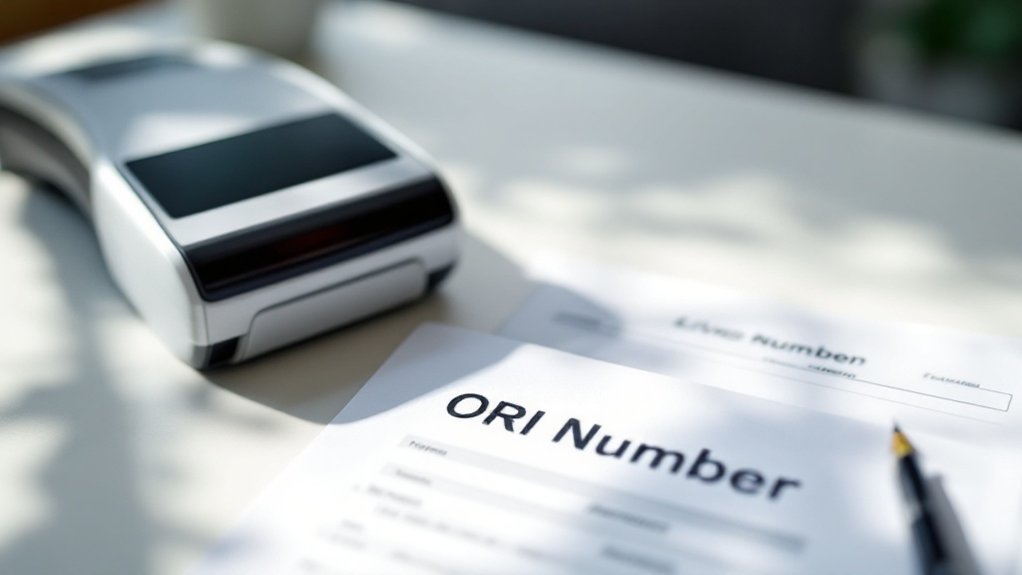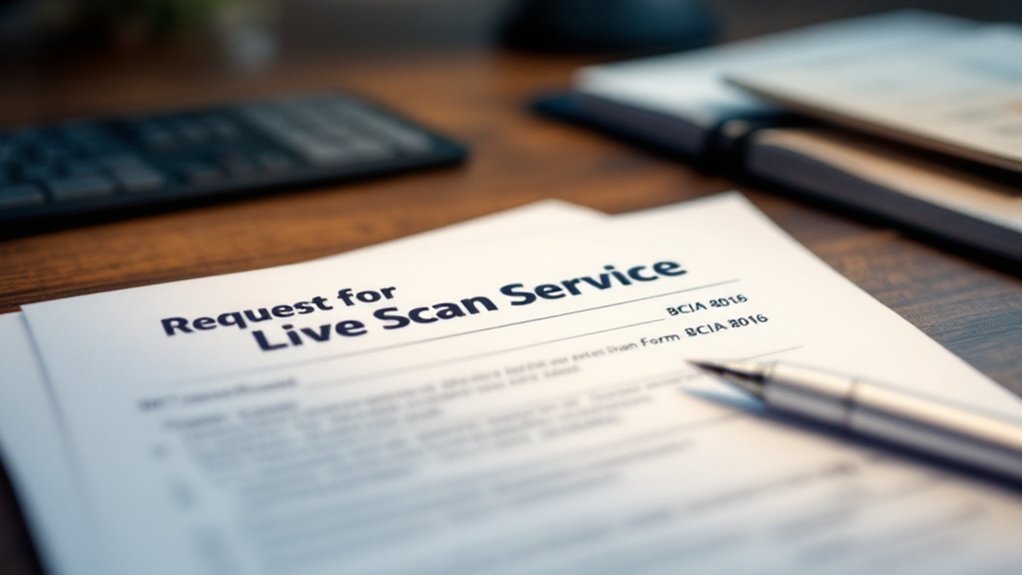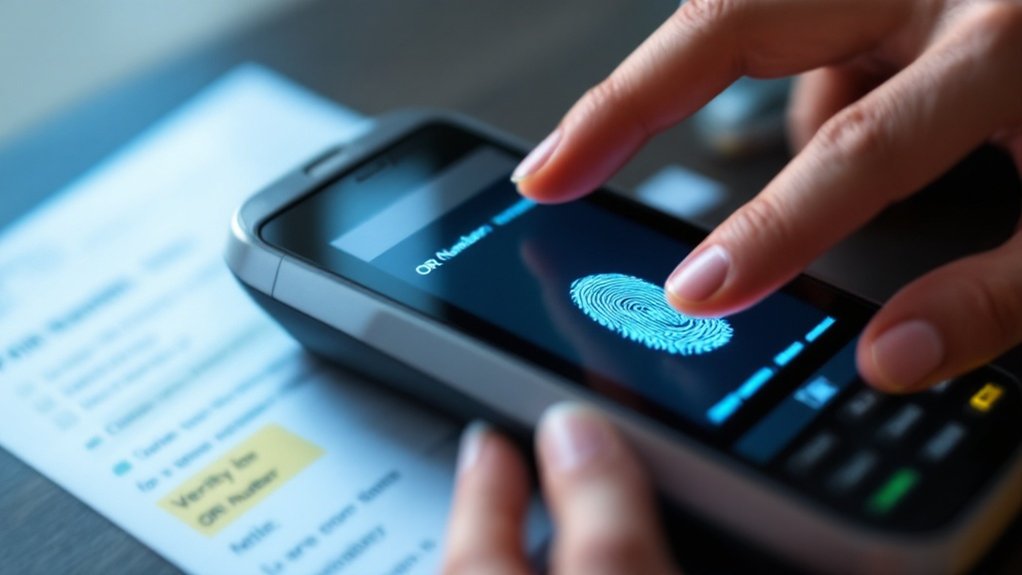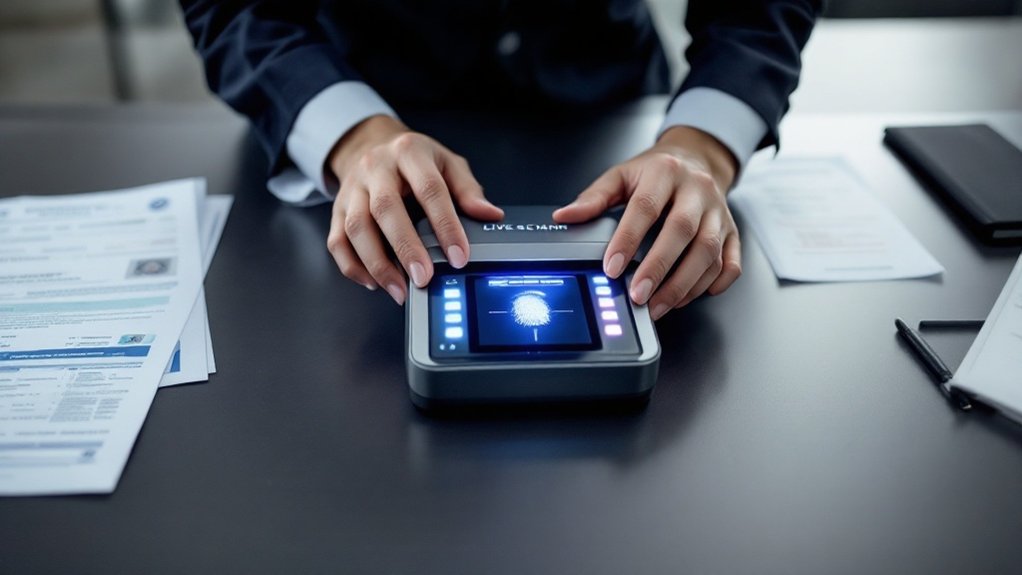To manage ORI numbers effectively in live scan fingerprinting, you’ll need to understand what they are and how they’re used. First, confirm your ORI number with the requesting agency or check provided documentation. Guarantee it’s correct to avoid processing delays. Verify the number before submitting fingerprints to certify timely results delivery. You’ll also want to familiarize yourself with common issues and best practices to streamline the process. Continuing with these steps will help you navigate the ORI system efficiently.
Understanding ORI Numbers

When you’re involved in Live Scan fingerprinting, understanding ORI numbers is crucial. An ORI, or Originating Agency Identifier, is a unique identifier assigned to agencies for fingerprinting services. It helps identify which agency should receive fingerprint results after processing. ORI numbers are typically nine characters long and are assigned by the FBI or state agencies. They are indispensable for Level 2 Background Checks and other fingerprint-based background checks, guaranteeing results are sent to the correct agency. By using an ORI number, you make certain that your fingerprint results are routed correctly, maintaining the integrity of the fingerprinting process. Additionally, ORI numbers ensure that agencies meet the established qualifying criteria for accessing and submitting criminal justice information, which is essential for their operational legitimacy.
Locating Your ORI Number
To locate your ORI number, you typically need to contact the agency requesting your fingerprints. This could be your employer, a regulatory agency, or a state department like the Florida Department of Law Enforcement (FDLE). In some cases, you might find the ORI number on documentation provided by the agency, such as an appointment sheet or email. If you’re unsure, reaching out to your human resources department is a good option. Some states also maintain online resources where you can find or request ORI numbers. In Florida, a VECHS number might be used instead for certain purposes. When using Livescan services, it is crucial to provide the correct ORI number to ensure that your fingerprints are processed correctly by the relevant agency.
Importance of Correct ORI Numbers

When you use the correct ORI number in live scan fingerprinting, you guarantee that your background check results are accurately routed to the appropriate regulatory agency, which is vital for maintaining compliance with legal requirements. This precise identification helps determine the focus of the screening, ensuring that the correct statutes are applied and the relevant offenses are scrutinized. By using the correct ORI number, you avoid potential issues such as invalid background checks, resubmission costs, and delays in processing, all of which can impact your employment or licensing timeline. Additionally, understanding the role of the OCA number is crucial, as it identifies the entity requesting the background check and ensures that results are sent to the correct recipient.
Importance of Correct ORI Numbers
Using the correct ORI number in Live Scan fingerprinting is essential for guaranteeing that your background check results are processed efficiently and securely. It ascertains timely processing, prevents misrouting of results, and avoids additional costs associated with resubmissions. By using the correct ORI, you maintain the confidentiality of sensitive information and streamline your application process for jobs or licenses.
Incorrect ORI numbers can lead to delays, misdirected results, and increased costs. They may also result in application rejection and raise legal and privacy concerns. To avoid these issues, verify the ORI with the requesting agency, use the latest forms, and double-check your information before submission. Ensuring the correct ORI is crucial because it acts as an Originating Agency Identifier, ensuring that results are delivered directly to the agency requesting the background check.
Agency Identification
How does the correct identification of agencies through ORI numbers impact the Live Scan fingerprinting process? Correctly identifying agencies via ORI numbers guarantees that background check results are sent to the right place. This is indispensable for licensing processes, as it prevents delays and misdirected results. ORI numbers, typically a 9-digit code, are assigned to agencies requesting Live Scan services, allowing them to receive the appropriate background check results.
In states like California and Florida, ORI numbers are critical for ascertaining that fingerprinting results are processed correctly. Agencies must register to obtain an ORI, which is then used during the electronic fingerprinting process. Incorrect ORI numbers can lead to additional costs and processing delays.
Timely Processing
Correct ORI numbers play a pivotal role in guaranteeing timely processing of Live Scan fingerprinting results. They confirm that your fingerprint data is sent to the right agency, preventing delays or rejection of background checks. Incorrect ORI numbers can lead to resubmission, additional costs, and delays in hiring or licensing processes.
To facilitate timely processing, verify your ORI number before submitting fingerprints. Utilize online tools to corroborate the number and confirm all demographic information is accurate. Choosing certified live scan providers also helps in maintaining quality and compliance. By following these steps, you can expedite the process and avoid administrative burdens on both you and the requesting agency.
Preparing for Live Scan Fingerprinting
As you prepare for live scan fingerprinting, it is vital to understand the process and what you need to bring. This will guarantee a smooth and efficient experience. Here are some key items to ponder:
- Valid Photo ID: A government-issued ID is required for identity verification.
- Cost Confirmation: Check the cost and payment method beforehand.
- Appointment Timing: Arrive on time to avoid delays.
- Mobile Services: Some providers offer mobile services for added convenience.
- Software and Equipment: Ensure the provider uses certified software and equipment.
Required Documents and Forms

When preparing for Live Scan fingerprinting, you need to gather specific documents to guarantee a smooth process. You will typically require a valid photo ID, such as a driver’s license or passport, and possibly a Request for Live Scan Service Form if required by your state or agency. Additionally, you should be prepared with a payment method and any agency-specific documents or reference numbers provided by the requesting agency. It is also important to ensure that your identification documents are original and unexpired, as copies of identification are generally not accepted during the fingerprinting process.
Required Documents
To guarantee a smooth Live Scan fingerprinting process, you’ll need to bring specific documents and forms. These documents are pivotal for verifying that your fingerprints are processed accurately and sent to the right agency.
- Request for Live Scan Service Form: Includes the ORI number and agency details.
- Form 8016: Used by most authorized applicant agencies.
- Valid Photo ID: Required for identity verification, which can include a driver’s license, passport, military ID, or other government-issued photo identification.
- Agency-Specific Documents: May include additional forms or instructions.
- Completed Forms: Validate all forms are filled out correctly before your appointment.
Photo ID
For Live Scan fingerprinting, you’ll need to present a valid government-issued photo ID to verify your identity. Common forms include a driver’s license, state ID card, passport, and military ID. These primary IDs must be current and unexpired. In some cases, a U.S. Passport or foreign passport with immigration documents can also be used.
As secondary forms, a birth certificate or Social Security card may be accepted, but they typically require additional supporting documents like utility bills or bank statements. Make certain your ID is legible and includes a photo. Copies or expired IDs may not be accepted, so it’s vital to bring original, valid documents.
Accurate personal details, including aliases, are crucial for ensuring that the identity verification process is efficient and reliable, as they help prevent confusion with other identities and streamline background checks.
Accurate Agency Information
Accurate agency information is essential in the Live Scan fingerprinting process, as it guarantees that your fingerprints are submitted to the appropriate agency for background checks. This verifies compliance with legal requirements and streamlines the process by reducing errors.
Accurate agency information:
- Verifies legal compliance for fingerprinting and background checks.
- Accelerates the processing of fingerprint data.
- Minimizes errors in fingerprint submission and processing.
- Facilitates faster background check results.
- Supports efficient communication between agencies and fingerprinting providers. Utilizing a network of 1200+ locations ensures that accurate agency information can be efficiently applied across various locations, enhancing the overall fingerprinting experience.
Verifying ORI Numbers

Verifying ORI numbers is essential in the Live Scan fingerprinting process, as these numbers serve as identifiers that direct your background check results to the correct agency. You can verify your ORI number through the agency requesting the background check or the regulating agency. It’s pivotal to obtain the latest number directly from the agency, as changes may occur. Employers typically provide the ORI number during employment offers, while licensing applications also include this information. For court-related matters, the Clerk of Court can assist with ORI details. Maintaining accurate records is paramount to guarantee timely and correct processing of background checks.
Common Issues With ORI Numbers
When you’re dealing with Live Scan fingerprinting, using incorrect ORI numbers can have significant consequences. This can lead to delays, rejections, and additional costs. Here are some common issues you might encounter:
- Incorrect ORI Usage: Leads to delays or rejection of background checks.
- Misrouting of Results: Causes results to be sent to the wrong agency.
- Delays and Costs: Errors result in additional costs due to resubmissions.
- Lack of Agency Identification: Prevents the requesting agency from receiving necessary results.
- Variability in ORI Codes: Different departments have unique ORI numbers, requiring precise identification. Ensuring accurate use of the ORI number is crucial as it serves as a unique identifier for authorized agencies, allowing them to submit fingerprint-based background checks to the appropriate authorities.
Best Practices for ORI Number Use

To guarantee the smooth processing of Live Scan fingerprinting, it is crucial to follow best practices for using ORI numbers. You should verify the ORI code with the requesting agency before submission to ascertain accuracy and avoid delays. Use the latest version of the Live Scan Service Form and work with experienced technicians for guidance. Double-check the form for errors before submission to prevent additional costs and stress. By following these steps, you can ensure efficient processing and compliance with regulatory requirements. Additionally, understanding that the ORI number is a 9-character identifier assigned to an agency helps in ensuring that the fingerprint results are directed to the appropriate agency, which is essential for accurate processing.
Troubleshooting ORI Number Errors**
Troubleshooting ORI number errors in Live Scan fingerprinting requires a proactive approach to avoid delays and misrouting of results. You need to identify and correct mistakes promptly to guarantee your background check is processed efficiently. Here are key steps to take:
- Contact the requesting agency to verify the correct ORI number.
- Review forms carefully for accuracy and completeness.
- Use the latest version of the Live Scan Service Form.
- Work with experienced Live Scan technicians for guidance.
- Double-check all details, including ORI and applicant type, before submission. By following these steps, you can prevent errors and certify your results are delivered correctly.
Conclusion
You’ve navigated the intricacies of ORI numbers in Live Scan fingerprinting. Now, ask yourself: What happens if you submit an erroneous ORI? Delays and misrouted results are just the beginning. Guaranteeing precision is pivotal for timely processing and avoiding additional costs. By following these steps, you can avoid common pitfalls and ascertain your background check results reach the right agency.

